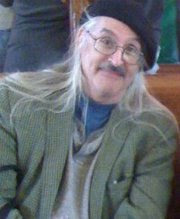Well, even the blog is getting the best of me despite all intentions to keep current. I'm now backlogged on two weeks of activity on the station. On to business.
I've recently added two of my favorite albums from my record collection to NeverEndingWonder Radio. I've featured selections from these albums in the years past but now both albums have been added to the library in their entireties. First up is The Naked Carmen.
The Naked Carmen was an "Electric Rock Opera" composed by John Corigliano and David Hess in 1968. It was released on Mercury Records in 1970 and I picked it up for a dollar in a cutout bin somewhere around 1973 or so. It fit nicely with my penchant for odd and unusual music. Pairings of Classical music and pop was still pretty rare back then. There had been Deep Purple's Concerto for Group & Orchestra, Days of Future Passed and a few others. IMO The Naked Carmen was the most successful attempt at melding Classical music with modern pop music, yet it remains a little known footnote in musical history.
I don't know why it never made more of a splash- perhaps it was TOO original- but it was a great composition expertly realized by a wealth of talented artists: David Hess himself, Melba Moore, The Detroit Symphony, Pig Iron and more. The Naked Carmen was conceived of as an updating of Bizet's popular opera, both musically and thematically. Updating the music side meant featuring the Detroit Symphony performing selections from Carmen with the addition of Moog Synthesizer, rock band and even a kazoo, as well as introducing some pop/folk numbers performed by Hess & Moore and other numbers set to tunes from Carmen with new lyrics.
Updating Carmen thematically meant creating a new role for Carmen herself. From the liner notes: "In this modern version of the opera written by Georges Bizet, the traditional vision of Carmen as temptress is rejected. Today, she is a heroine.
In the last 10 years, Carmen has emerged as a compelling spokesman, not only for the concept of women's liberation, but for the whole prospect of an exciting life of free morality; a life in which new concepts of human purpose and tolerance will permit man to refashion his institutions to permit the full development of every individual." Yes, this was the 70s, focused very much on individuality, as well as class issues. This was deftly illuminated using tape montage featuring clips of Adolf Hitler's speeches and Spiro Agnew's infamous "effete intellectual snobs" quote.
The album itself got a deluxe treatment with a booklet that included full lyrics and a series of bizarre collages. Here is one:
John Corigliano went on many other accomplishments, such as penning the soundtracks for "Altered States" and "The Red Violin" for which he won an Academy Award. David Hess went on to star in Wes Craven's infamous "The Last House on the Left," as well as writing the soundtrack for that film. Hess has appeared in many film roles including parts in Zombie Nation and Zodiac Killer. He has also remained active in the music industry.
Here is a link to a webpage with a wealth of info on The Naked Carmen:
The Naked Carmen
Here's a link to David Hess' website:
David Hess
Ragnarok: Electronic Funk by Beaver & Krause was one of the first albums I bought after becoming mesmerized by electronic music. Bernard Krause was an unlikely figure to be part of the electronic music vanguard- he was a former member of The Weavers and was acting as a staff producer for Elektra Records when he met jazz musician Paul Beaver. How these two managed to collaborate on some of the most interesting electronic music to come out of the 60s and 70s is any one's guess. Ragnarok was their second album together (the first was The Nonesuch Guide to Electronic Music- intended as a showcase of the Moog Synthesizer's capabilities) and it's an amazing document of electronic music in 1969. Several numbers display the sheer fascination with electronic sound one could have in the 60s when all of this was still new to us. There are a couple of novelty numbers- Dill Piccolo and Dr. Fox that remind me of Perrey & Kingsley if the had made SIDs. There are also some hauntingly beautiful melodies. Altogether a well rounded example of what electronic musicians were capable of in 1969.
Beaver & Krause recorded four albums together. Paul Beaver recorded one solo album of electronic music before suffering from a heart attack. Bernard Krause went on to pioneer the field of bio-acoustics and released many albums of environmental recordings.
Both of these wonderful oddball albums lost in the cracks of musical history can be heard on NeverEndingWonder Radio
Thursday, May 15, 2008
The Naked Carmen and Ragnarok
Subscribe to:
Post Comments (Atom)


No comments:
Post a Comment